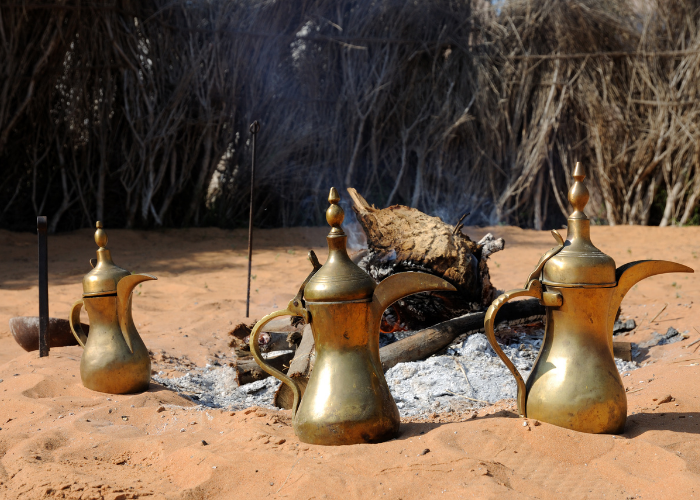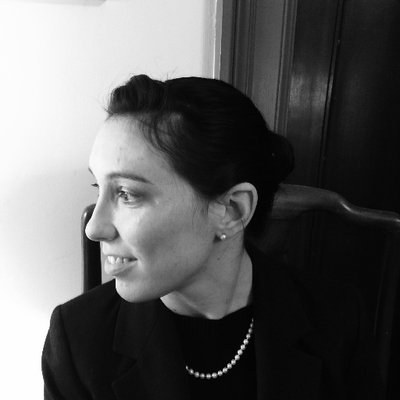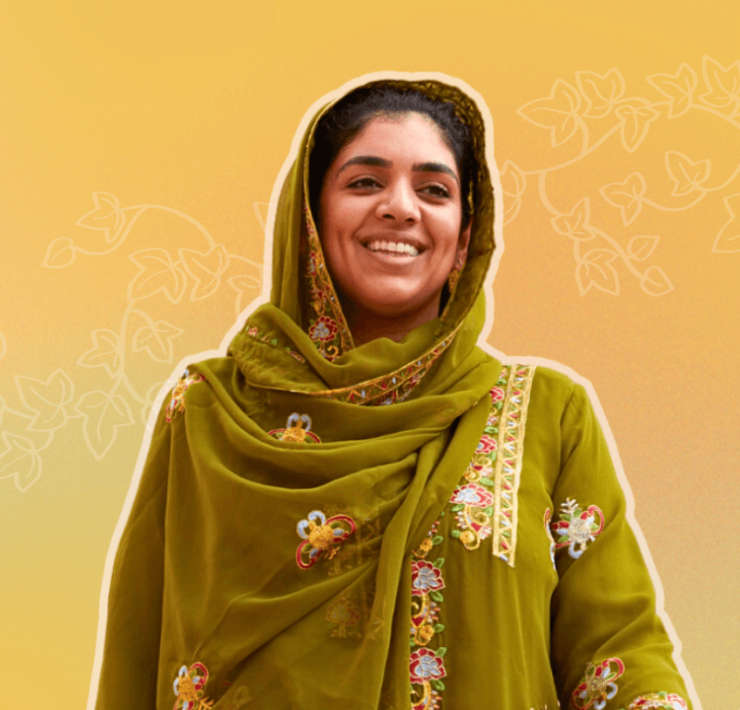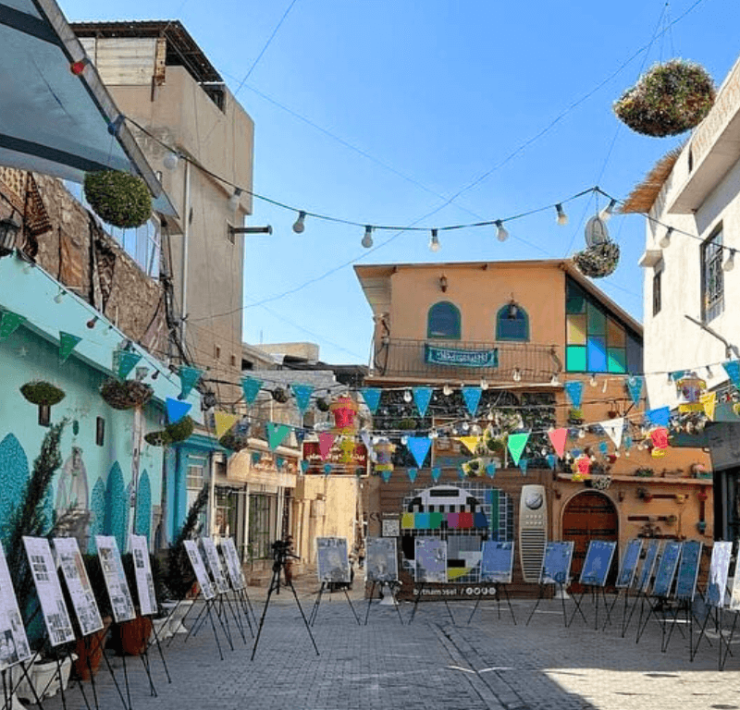Have you ever felt something truly, passionately, and deeply, but weren’t able to share your feelings with anyone?
What did you do?
If you answered “wrote it down,” or “vaguebooked about it,” keep reading…
What if it wasn’t just that you didn’t have anyone to confide in, but you couldn’t share those feelings at all?
Bedouin women have often found themselves in this position, caught between their own thoughts and their society’s expectations of modesty.
So, what do they do? Compose poetry.
Bedouin women’s poetry is a rich, if little-known tradition of verse that stretches from Pre-Islamic Arabia all the way to the present day. While known within the Gulf and preserved in local communities, it rarely receives large-scale attention, generally because the emotional lives of women are considered culturally sensitive. In fact, the only collection of Bedouin women’s poetry (entitled, simply enough, Bedouin Poetesses or Sha’irat min Al-Badiya) was compiled by Abdullah ibn Raddas, who travelled throughout Saudi Arabia in the 1950s and ‘60s in the course of his work as a school inspector for the Ministry of Education.
His project wasn’t exactly well-received, though.
Some would only share the poems they knew if the name and tribal affiliation of the poet was not shared.
Others sent ibn Raddas death threats.
Why? Because these poems are intensely personal (and sometimes sexual) in nature. These women wield their verses like swords, cutting down cruel relatives and husbands who didn’t keep up their ends of the marriage-bargain. One woman, after eight years of marriage and no children, asks her husband for a divorce this way (translation by Marcel Kurpershoek1):
How about a man who bought a set of coffee pots and mortar, but did not pound the beans in it for eight years now.
Either he does as men should do, or let him leave them for someone else’s use.
Here, the author’s desire for a physically fulfilling relationship and children (which would be considered typical in her culture) are expressed through another typical image in Bedouin poetry, that of coffee and coffee pots. Further, as coffee pots are symbols of hospitality, one of the essential obligations of a Bedouin, we come to understand both the depth of the speaker’s disappointment and the legitimacy of her request. This is far from a reciprocal relationship.

Other poems are more overtly erotic, even suggesting trysts that tribal law would forbid. In the following example, taken from ibn Raddas’ collection and translated by Moneera Al-Ghadeer2, the image of the veil is particularly evocative:
O beloved,
I give you my veil in ransom for you
Although its beads
Are lost.
I remember them when we met
Together,
Behind the camp,
O beloved,
My eyes are watching over you
Like a herdsman
Watching his camels.
This short piece is packed with vivid imagery expressing both the speaker’s passion and the transgressive nature of her acts. She gives her veil, the physical symbol of her modesty as a ransom for her lover, implying she would trade it for a chance to be with him again. Yet, its beads are lost. How did that happen? Our speaker doesn’t tell us directly — she simply notes that they were there the last time she and her lover were together. There is no hint of regret here, though. She took a risk to be with him and she would do it again. Until he returns to her, she will scan the desert horizon for him, looking out for him with the same anxious care and concern a herdsmen has for his camels, his livelihood.
Emotions run high in many of these pieces, but not all are outlets for forbidden feelings — sometimes the poets are simply fed up. In this example, the noted poet Mwedi Al Barazia of the Mutair tribe fires back at her husband for calling her tall, athletic body unattractive while preferring the same qualities in his horses (again translated by Marcel Kurpershoek3):
Just sit in your tent and get lost,
let it collapse on you!
I hope I bear you no child,
no kid playing with young jerboas.
I don’t know about you, but that definitely reminds me of things I’ve seen on social media!
Paradoxically, these poems’ relatability is what makes them so sensitive — for all of the freedom that Bedouin women traditionally enjoyed in the desert, custom (both then and now) directs people to keep private matters private.
But, as always, women find a way to make their voices heard.
Bedouin women’s poetry gained international attention in 2010 when a Bedouin poet from Saudi Arabia named Hissa Hilal made it to the final round of the Emirati reality show “Millions Poet,” a venture that has helped to renew interest in Bedouin poetry, called nabati in Arabic.
She took the stage and, in no uncertain terms, condemned radical clerics who issue fatwas in support of religious violence.
For this, she too received death threats for daring to express her thoughts so publicly. Many said that her actions were immodest, but she stood her ground, and, dressed in a black cloak and face veil, recited her work to an audience of millions.
She came in third place overall.
She has since published a book demonstrating how many of the poems in ibn Raddas’ collection prove that Bedouin women took a much more active role in their lives, especially in matters of marriage and divorce, than many self-styled Saudi conservatives will admit. She, a proud woman who treasures her heritage, hopes that modern Saudi society will listen to these voices from the past and learn from them.
As a Western woman, I connect with these works on another level. To me, they echo the mircopoetry I find online, those semi-anonymous lines of love, loss, loneliness, and frustration that the digital generation writes to everyone and no one and posts to social media. The thoughts we feel we have to share but can’t share, at least not IRL.
You know the ones.
Because we’re all caught up in webs of expectations, hopes, fears, and social obligations.
And we all deserve to be heard.
Dr. Valerie — @drvaleriedesigns on IG and @DrVHSmitherman on Twitter.
Works Cited/Further Reading:
1https://www.thenationalnews.com/uae/using-poetry-to-take-a-stanza-1.358080
2from ibn Raddas, Sha’irat min al Badiyah, p. 52, trans. Al-Ghadeer: 2009, p. 36
3https://www.thenationalnews.com/uae/using-poetry-to-take-a-stanza-1.358080
———-

Dr. Valerie has spent most of her life traveling the world studying ancient poetry. After completing her Ph.D. in Classics at the University of Bergen, Norway, she fell in love with the evocative imagery she found in Bedouin poetry. This lead to several trips to the Middle East, Arabic classes, and a year in Saudi Arabia. Since COVID-19 has put her travels on pause, she’s now working on transforming her research into an open-access digital project. She shares a new Arabic proverb every Wednesday on IG @drvaleriedesigns.







thank you for this wonderful article.. Bedouin women are often overlooked in poetry and barely talked about so i was truly pleasantly surprised when i saw this
Thank you Meera! So glad you enjoyed it. Please do let us know if you have any other good resources!